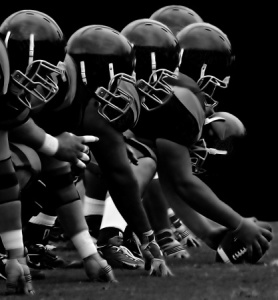A Simple Way To Measure Team Effectiveness
Americans love football. It’s the perfect symbol for effective teamwork.
 The job of the offensive line is to score touchdowns, and the defensive line is to prevent the other team from scoring. Every player has a defined role, and if they want to win then they must work together as a team.
The job of the offensive line is to score touchdowns, and the defensive line is to prevent the other team from scoring. Every player has a defined role, and if they want to win then they must work together as a team.
There are 32 teams in the National Football League (NFL). Only one of them will win the Super Bowl each year. It’s the biggest goal any football team can achieve.
But only 1 out of 32.
What does that say about the other 31 teams, especially those that don’t advance to the playoffs? Are they no good? Do they not play well as a team? Should they just forget about their goals?
Even the worst teams have good football players (you have to be really good to get selected to play for any NFL team). Every football team plays as a team, and they’re always striving to win. That’s how the game works.
But the definition of success might be different for each team.
The team scoring last place (#32) might consider it a huge win if they move up seventeen spots the following year (to #15). Or the team that finally advances to the playoffs might consider this to be their “big win.”
It’s all about the team’s perspective of success.
The same is true in business.
Measuring Team Effectiveness
One company seems to grow quickly and capture huge market share, while others struggle or even flounder. Another company manages to create a breakthrough product that customers line up to buy, while others experience failure after failure.
Many companies claim Teamwork as a core value. But does it make a real difference?
Simply stating “Teamwork” as a value is useless. Promoting it and rewarding positive behavior can help. But unless everyone on the team embraces the true essence of teamwork – collaborating and working together for a common purpose or goal – the benefits of teamwork remain elusive.
This may be one reason why there are lots of business consultants. In fact, there’s an amazing number of “Team Effectiveness Models” on the market today. A search on Google reveals as many different types of models as there are books in a library.
Yet, the simplest way of measuring team effectiveness is to ask the members of the team:
On a scale of 1 to 10 (where 1=low, 10=high), how would you score the effectiveness of your team? And why?
The scores received will be interesting, especially when compared to previous scores. But the real benefit of this approach is the answer to the question “Why?”
If team members feel good about their performance as a team, they’re effective.
It’s important to note that this question is not directed to customers (fans) or critics (media). They are not members of the team. They don’t understand all of the issues and challenges that impact the team.
Consider this. A team might view themselves effective if they reduce losses by 90%, or make sure no one is laid off. They could also consider it a real win by securing some key players that prepare them for the future, or advancing an exciting new product so it’s ready for commercialization.
Team effectiveness is less about who is winning right now and more about being prepared to win next year and the years after that.
How would you score the effectiveness of your team where you work, and why?








